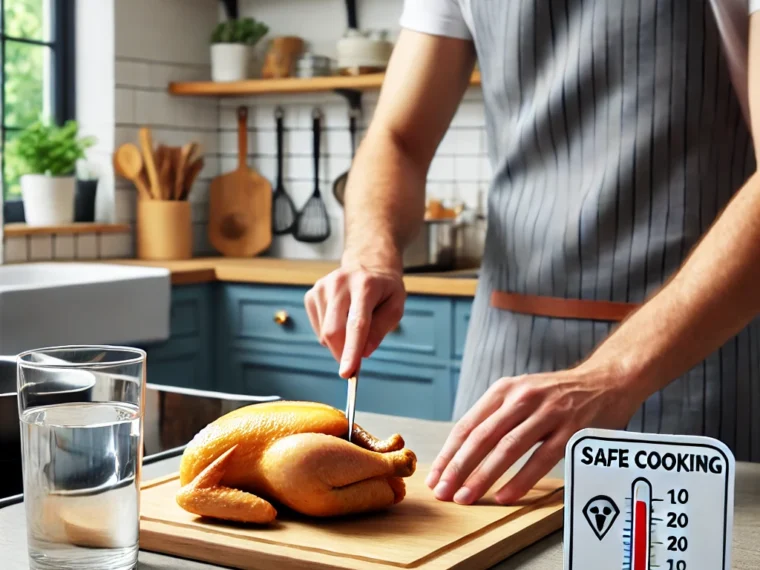Why You Should Stop Washing Raw Chicken: A Detailed Explanation
Washing raw chicken under the tap has been a long-standing kitchen practice, passed down through generations. However, food safety experts and public health organizations now strongly advise against it. Here’s why washing raw chicken can be harmful and what safer practices you should adopt.
Why Do People Wash Chicken?
Many people wash raw chicken to remove visible blood, slime, or perceived impurities. Some also believe that rinsing helps reduce bacteria or contaminants on the surface. Additionally, this habit may be cultural or traditional, as people have long thought that washing ensures cleaner meat before cooking.
The Problem with Washing Raw Chicken
- Bacterial Spread Through Water Splashes Raw chicken often carries harmful bacteria like Salmonella or Campylobacter. Washing chicken under running water can cause these bacteria to splash onto surrounding kitchen surfaces, utensils, and other foods. In fact, studies show that water droplets can travel up to 3 feet, significantly increasing the risk of cross-contamination.
- Washing Doesn’t Remove Bacteria, But Cooking Does Washing raw chicken doesn’t effectively remove bacteria. Instead, it can spread bacteria to other areas in your kitchen. The only way to kill these harmful pathogens is by cooking the chicken to an internal temperature of at least 165°F (74°C). Washing chicken does nothing to improve safety and instead increases the risk.
- Increased Risk of Foodborne Illness Cross-contamination from washing raw chicken can lead to foodborne illnesses, such as those caused by Salmonella or Campylobacter. These infections can cause symptoms like diarrhea, abdominal cramps, fever, and vomiting. In severe cases, they may lead to long-term health complications or hospitalization.
The Science Behind Not Washing Chicken
The USDA (United States Department of Agriculture) and the CDC (Centers for Disease Control and Prevention) both discourage washing raw chicken. Studies confirm that this practice spreads bacteria rather than reducing it. The only scientifically proven method to kill harmful pathogens is cooking the chicken to the correct temperature.
How to Handle Raw Chicken Safely
Here are some steps to handle raw chicken safely and reduce the risk of contamination:
- Skip the Rinse: Never wash raw chicken under any circumstances.
- Use a Clean Surface: Always prepare chicken on a designated cutting board that is separate from those used for vegetables or fruits.
- Wash Your Hands Thoroughly: Wash your hands with soap and warm water for at least 20 seconds before and after handling raw chicken.
- Clean Tools and Surfaces: Immediately clean cutting boards, knives, and countertops with hot, soapy water or a disinfectant after handling raw chicken.
- Properly Cook Chicken: Use a meat thermometer to ensure the internal temperature of the chicken reaches 165°F (74°C).
- Store Safely: Store raw chicken in sealed containers or bags in the refrigerator and cook it within 1–2 days. If freezing, ensure the chicken is tightly wrapped.
Common Misconceptions About Washing Chicken
- Myth: Washing removes bacteria.
Fact: Cooking is the only method that kills bacteria effectively. - Myth: Rinsing with vinegar or lemon juice makes it safe.
Fact: Although acidic solutions may reduce bacteria slightly, they are not effective enough to eliminate harmful pathogens. - Myth: Washing is necessary to remove slime or residue.
Fact: Any residue will naturally cook off during preparation.
Final Thoughts
While washing chicken may seem harmless, it poses significant risks to your health and the cleanliness of your kitchen. By skipping this unnecessary step and following safe food handling and cooking guidelines, you can enjoy your chicken dishes with confidence. Let the heat of cooking do the work to kill harmful bacteria.
Take the advice of food safety experts—ditch the rinse and cook with confidence!
